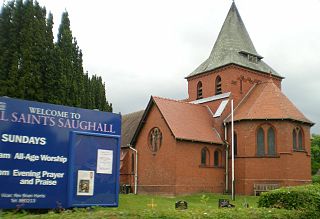Thomas Edward Wright (1861–1956) is an English greyhound trainer. His family was known for its success during the late 19th century. He is the youngest son of Joseph & Anne Wright of Avenue Farm in Waverton, Cheshire. One of seven children, he followed his brothers Jack Wright and Joe Wright into greyhound training.

England is a country that is part of the United Kingdom. It shares land borders with Wales to the west and Scotland to the north-northwest. The Irish Sea lies west of England and the Celtic Sea lies to the southwest. England is separated from continental Europe by the North Sea to the east and the English Channel to the south. The country covers five-eighths of the island of Great Britain, which lies in the North Atlantic, and includes over 100 smaller islands, such as the Isles of Scilly and the Isle of Wight.

The Greyhound is a breed of dog, a sighthound which has been bred for coursing game and Greyhound racing. Since the rise in large-scale adoption of retired racing Greyhounds, the breed has seen a resurgence in popularity as a family pet.
Born Joseph Wright in Waverton, Cheshire, the second eldest son of Joseph & Ann Wright.
Initially he trained at Hey House in Saughall, Cheshire for the Fawcett brothers, whom his father had bred and trained for, before moving his training to the Caeau, near Hope, Flintshire. In his later years he lived at Saighton, Cheshire. Training greyhounds for coursing Tom Wright employed many different methods to ensure his dogs successes; hanging pig carcasses from a tree encouraging the dogs to jump to strengthen their hind legs and teaching them to jump drainage ditches that they may encounter during the coursing.

Saughall is a village and former civil parish, now in the parishes of Saughall and Shotwick Park, Puddington and the unparished area of Chester, in the unitary authority of Cheshire West and Chester and the ceremonial county of Cheshire, England. It is situated approximately 3 miles (4.8 km) north west of Chester and close to the Welsh border. The civil parish was abolished in 2015 to form Saughall and Shotwick Park, part also went to Puddington and Chester unparished area.

Cheshire is a county in North West England, bordering Merseyside and Greater Manchester to the north, Derbyshire to the east, Staffordshire and Shropshire to the south and Flintshire, Wales and Wrexham county borough to the west. Cheshire's county town is the City of Chester (118,200); the largest town is Warrington (209,700). Other major towns include Crewe (71,722), Ellesmere Port (55,715), Macclesfield (52,044), Northwich (75,000), Runcorn (61,789), Widnes (61,464) and Winsford (32,610)

Hope is a small village and community in Flintshire, north-east Wales. The village is located approximately 3 miles / 4.5 km from the Wales-England border, on the course of the River Alyn, and less than 5 miles from Wrexham.
1895 saw the dominance of the Wright family in the Waterloo Cup competition, Joe trained the winner Thoughtless Beauty, Tom trained the runner up Fortuna Favente and another brother Robert Kelsell Wright slipped the dogs in the final.

The Waterloo Cup was a coursing event. The three-day event was run annually at Great Altcar in Lancashire, England from 1836 to 2005 and it used to attract tens of thousands of spectators to watch and gamble on the coursing matches. It was founded by The 2nd Earl of Sefton and, originally, was supported by his patronage.
Robert Kelsell Wright (1858–1908) was the third eldest son of Joseph & Ann Wright of Avenue Farm, Waverton, Cheshire, United Kingdoma. Robert obtained his middle name from his paternal grandmother Elizabeth Kelsell and did not follow his brothers, Jack Wright, Joseph Wright & Tom Wright into greyhound training. Robert started slipping at coursing events from 1881 at meetings around the country he successfully slipped the Waterloo Cup finals as an approved greyhound slipper in 1890, when he slipped the legendary Fullerton and again in 1895 when his brothers had trained the finalists. Coursing correspondents described the slipping as being performed with great success.
In the White Lion public house in Brampton, Cumberland he purchased the greyhound bitch Fair Future for £5 from the landlord. The bitches litters yielded amongst the first Waterloo Cup winning greyhound for the Fawcett brothers and Tom Wright.
The following is a list of the Waterloo Cup winning greyhounds that he trained:
- 1896 Fabulous Fortune
- 1900 Fearless Footsteps
- 1901 Fearless Footsteps
- 1902 Farndon Ferry
- 1903 Father Flint
Acknowledged by Charles Blanning and Sir Mark Prescott as one of the great trainers of all time, [1] he died at his daughter's house in Whitford, Flintshire, in 1956.
His son Ralph was the manager at Hove greyhound stadium, and his son John also trained greyhounds, winning the Waterloo Cup 4 times.


